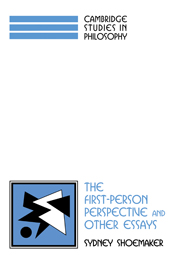9 - Unity of consciousness and consciousness of unity
Published online by Cambridge University Press: 16 January 2010
Summary
To speak of unity of consciousness is among other things to speak of an aspect of our awareness of external things, and so of something falling within the province of epistemology; and to speak of consciousness of unity – whether unity in the world or unity in our minds – is likewise to speak of something epistemological. But unity of consciousness has also been held to be a determinant of – to be partly constitutive of – mental unity, the belonging-to-one-mind (what Russell called “copersonality”) of different mental states, and self-consciousness has been held to be a component of the unity of consciousness that plays this constitutive role. And whether this is so, and if so how, is of course a metaphysical issue. This essay is an exploration of this mix of epistemological and metaphysical issues. These are, of course, Kantian themes – but I shall stay clear of any attempt to expound Kant's own thinking about them. Although my ultimate concern is with self-consciousness and mental unity, the consciousness I shall begin with is our perceptual consciousness of the world.
Let us begin with a case – any case – of visual perception. Any object one sees will have parts, and in seeing the object, one will see various of its parts. And in typical cases, in order to see that something is an object of a certain kind, one must not only see a number of its parts, and see what properties these have individually, but must see how they are related to one another.
- Type
- Chapter
- Information
- The First-Person Perspective and Other Essays , pp. 176 - 198Publisher: Cambridge University PressPrint publication year: 1996
- 8
- Cited by



